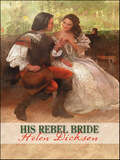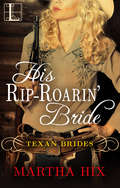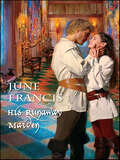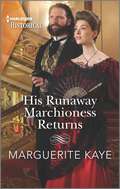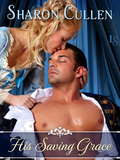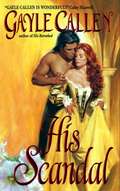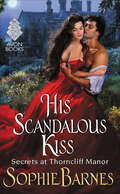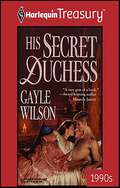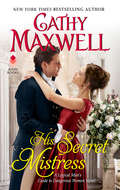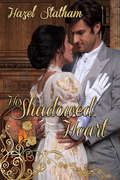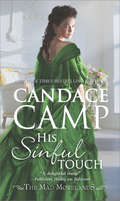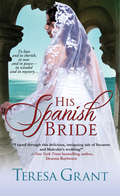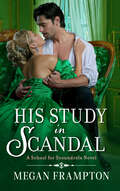- Table View
- List View
His Rebel Bride
by Helen Dickson'Break as many hearts as you please, Marcus, but you'll not break mine.'In the dark days of rebellion against King James, a woman is wagered on a turn of the cards....Marcus, Lord Reresby, is the loser. Now he must marry the daughter of the man he hates. Her beauty, spirit and fortune will be some small recompense-and he has never found it difficult to tame women before....But passionate Catherine will not be tamed. She makes no secret of her hatred or her dangerous political beliefs, and Marcus comes to realize that he has let a rebel into his house...and his heart!
His Reluctant Mistress
by Joanna MaitlandLord Leo Aikenhead--renowned rake, skilled seducer and expert spy--has finally met his match. For opera singer Sophie Pietre may have the voice of an angel, but she will be no man's strumpet--no matter how handsome he is!But these are dangerous times in Vienna, with betrayal and deceit round every corner. Sophie's tempted by his offer of protection and--she can no longer deny it--even more tempted by the offer of a place in his bed....
His Rip-Roarin' Bride (Texan Brides #2)
by Martha HixA bride best kept under lock and key . . .Packing a six-shooter, Lisa-Ann Wilkins roars into Lubbock, Texas, determined to take out the man who killed her best friend. But a shoot-out at the local saloon only lands the bold beauty in the custody of Sheriff Wes Alington—and the real trouble begins. When the handsome lawman gives her the choice to keep his house until she settles the debts her havoc caused, it’s an offer she can’t refuse, despite the simmering attraction between them...Wes knows keeping Lisa-Ann close is only going to lead to a pack of problems. For how can he preserve her honor when all he wants to do is take her to his bed? Then there’s the little matter of her plan to murder a local man. But once Wes sees Lisa’s vulnerable side, he knows the feisty lawbreaker is fast on her way to stealing his heart...Praise for Martha Hix“A romantic mixture of sensitivity, humor and spice, Martha Hix's delicious love story offers a refreshingly atypical heroine.” —RT Book Reviews, 4 Stars, on Terrific Tom"Filled with humor...and a wealth of love. Enjoy!” —RT Book Reviews on Magic and the Texan
His Road to Redemption: An Uplifting Inspirational Romance
by Lisa JordanA veteran in need of a fresh start will get more than he bargained for… Veteran Micah Holland's scars go deeper than anyone knows. An inheritance from his mentor could be a new beginning—if he shares the inherited goat farm with fiercely independent Paige Watson. Now the only way they can keep the farm is to work together. But first Micah must prove he's a changed man to keep his dream and the woman he's falling for.From Love Inspired: Uplifting stories of faith, forgiveness and hope.
His Runaway Lady (Mills And Boon Historical Ser.)
by Joanna JohnsonFrom one convenient marriage…To another?Shunned by society because of his parentage, half-Roma blacksmith Fell Barden lives a simple life alone in the forest until his peace is disturbed by an injured runaway lady. Fleeing a forced marriage, Sophia Somerlock needs his help. Caring for the intriguing miss, Fell feels an intense connection to her. The obvious solution is to save her by marrying her himself…but that would mean returning to the ton that rejected him…“I really didn’t think the author would be able to top her debut but my good lord this book was perfect! Overall this was a truly beautifully written book, with flawless prose, realistic characters and a very unique plot… I loved it!”—The Reading Debutante on Scandalously Wed to the Captain“I’m highly impressed! I look forward to seeing what Ms. Johnson has for us in the future. She is definitely an auto-buy for me from now on!— Goodreads on The Marriage Rescue
His Runaway Maiden
by June FrancisEscaping her cruel stepmother, Rosamund Appleby dresses as a youth and heads for London…until she is halted in her tracks by Baron Alex Nilsson! Intrigued by this boy he suspects is really a wellborn young lady, Alex seeks to protect her as they journey together.But when Alex, who trusts no woman, finds himself hastily and conveniently married to beautiful, courageous Rosamund, he doesn't know which is more dangerous: the enemies plotting his downfall or the seductive lure of a curvaceous woman in his bed….
His Runaway Marchioness Returns
by Marguerite KayeEnjoy this Victorian second chance romanceFrom convenient marriage...To inconvenient attraction!Industrialist Oliver, the new Marquess of Rashfield, has become society&’s most eligible bachelor. The problem is he's already married! Honorable Oliver conveniently wed his best friend&’s sister Lily years ago, and since then they&’ve built separate, fulfilling lives. Now Lily has returned for a long-overdue divorce, but Oliver needs his marchioness again until he secures his inheritance. They've never shared a house… Sparks are sure to fly! From Harlequin Historical: Your romantic escape to the past.
His Saving Grace
by Sharon CullenPerfect for fans of Mary Balogh, Sharon Cullen's captivating novel tells the deeply emotional tale of two devoted lovers facing the ravages of war. For months now, Lady Grace Ashworth has mourned the death of her beloved husband--until the day a very-much-alive Michael arrives at her front door. It's nothing less than a miracle. However, Grace soon realizes that this Michael isn't the same man who left for the Crimean War. She's stunned to learn that he has suffered a devastating head injury. Putting all her own desires aside, Grace resolves to devote herself to Michael's recovery and to love him no matter what troubles may come. Convinced that his wife is wasting her time on a broken man, Michael attempts to shield Grace from a life of inconvenience by driving her away. But Grace will have none of that. Despite every obstacle Michael throws in her path, she stubbornly soldiers on, fighting not only for their marriage but for the love they once shared. In the end, will her determination alone be enough to save Michael from the darkness that threatens to consume him?Praise for His Saving Grace "Cullen writes an emotional and unique story about a couple's journey to salvation. . . . Recommended for historical romance readers who appreciate feel-good, emotionally substantial, 'love conquers all' tales."--Library Journal "Cullen has marked herself as an author to watch."--Publishers Weekly "Heart-wrenching and full of real emotion, proving that love is always the answer, His Saving Grace is the best book I've read this year!"--USA Today bestselling author Bronwen Evans"Few writers can spark a lonely heart to life like Sharon Cullen in His Saving Grace."--Violetta Rand, author of Surrender"I heartfully applaud Ms. Cullen for writing this book, considering the sensitive nature of the subject matter. Historical romance novels rarely tackle such a serious subject, but Ms. Cullen does it with sensitivity and honesty. I highly recommend this book, whether you have read the others in the series or not, and I'm giving it five stars."--Buried Under Romance "If you enjoy a well-written historical romance with great character development then I have no hesitation in recommending His Saving Grace."--Romantic Historical Reviews "Michael and Grace's story [made] me sit with crossed fingers hoping everything turned out like it should. Everything did, of course, but that ending wouldn't have been as perfect if not for the journey that got these two wonderful characters there."--Written Love "This was a very moving and powerful story by Cullen. I can't wait for the next book."--Historical Romance Lover "A beautiful story that was well written."--What I'm Reading "This was a wonderful novel. . . . Every once in a while, I want to read a book that makes me think."--Laura Tague "With secondary characters that fill in the story nicely, [His Saving Grace] is a wonderful installment to the series."--I Am, Indeed Includes a special message from the editor, as well as an excerpt from another Loveswept title.
His Scandal
by Gayle CallenTaming a Rogue Lady Emmeline Prescott is shocked when Sir Alexander Thornton, the most incorrigible scoundrel in England, suddenly notices she even exists-and starts flirting with her! The dashing cad has a well-earned reputation for carousing that brings a blush to checks, but more distressing still I is the unwanted desire he arouses in her! To win a wager, Alex must win a kiss from an innocent maiden, But first he must get past the giggly girl's chaperone-her straitlaced older sister, Lady Emmeline. And to his dismay, it is the enchanting, levelheaded Emmeline who intoxicates him with her soft sensuality and eminently kissable lips. Yet such a conquest is unthinkable-unless Alex abandons his cherished reprobate ways... and surrenders to his heart's traitorous yearning for a true and passionate love.
His Scandalous Kiss: Secrets at Thorncliff Manor (Secrets At Thorncliff Manor Ser. #3)
by Sophie BarnesA masquerade ball reveals the heart’s secret desires in this scintillating Regency romance from the bestselling author of The Earl’s Complete Surrender.Richard Heartly has exiled himself from society since the war, plotting his revenge for a terrible betrayal. A masked ball at Thorncliff Manor is intended to be a brief diversion. Instead, he encounters a fascinating young woman as entranced by the music as he is. He can’t reveal his identity to Lady Mary. But her siren song keeps drawing him back, and their clandestine meetings could be hazardous to his plan—and to her virtue . . .Avoiding an unwanted marriage was easy when Lady Mary was ignored by the ton. Thanks to her dazzling appearance at the masquerade, she’s a wallflower no longer. Eligible suitors abound, yet the only man she wants is the brooding, seductive companion who keeps his face hidden. A man who tempts her to disclose her own shocking secret, one that could divide them forever . . .“Has just the right amount of enchantment mixed with poignancy to fulfill readers’ fantasies. The depth of emotions, the light of the redeeming power of love, and the intrigue and suspense make this third installment Barnes’ strongest tale to date.” —RT Book Reviews (4 stars)
His Secret Daughter
by Lisa CarterEnjoy this sweet, small town romance from top author Lisa CarterHe just found out he’s a father, but is he ready for a family of his own?When veteran Jake McAbee learns he has a daughter, he’s determined to raise the adorable toddler. But Maisie’s foster mom, Callie Jackson, insists Jake stay at her orchard until he’s prepared for fatherhood. While Jake and Masie bond, the trio begins to feel like family. Could the best home for Maisie be the one Jake and Callie create together?From Love Inspired: Uplifting stories of faith, forgiveness, and hope. Experience more sweet romances from Lisa Carter:His Secret DaughterThe Twin BargainStranded for the HolidaysA Mother’s HomecomingThe Christmas Bargain
His Secret Duchess
by Gayle WilsonMary Winters Harbored A Secret Deep Within Her HeartShe'd borne the duke of Vail a child and was determined that no one-not even the noble love of her life himself-would ever uncover the truth.Afire with the passion of youth, Nick Stanton had lain with Mary Winters. Now, scarred by warfare in mind and body, he feared he'd be no fit husband to his beloved-or father to the son now claimed by another man, a man whose one desire was to wreak vengeance on them all!
His Secret Mistress: A Logical Man's Guide to Dangerous Women Novel (Logical Man's Guide to Dangerous Women)
by Cathy MaxwellAt the Logical Men’s Society—an exclusive bachelor’s club—brandy flows like water, bawdy stories abound, and a gentleman tempted to marry is always persuaded to reconsider . . .Brandon Balfour made the mistake of trusting his heart to the exquisite, strong-willed actress, Kate Addison, with whom he shared one intimate night before fate intervened. Now a decade later, Brandon is a leading member of the Logical Men’s Society—for no woman since Kate has managed to captivate him.To Kate, the memory of that night still burns strongly, because it was followed by a stunning betrayal. A chance encounter may have brought Brandon back into her life, but that doesn’t mean Kate will ever forgive him. She’s vowed to make him pay—even as she realizes the promises of the young love they once shared are still etched upon her heart . . . Loving her exiled him. Trusting him ruined her. And now, a clash of passions threatens everything each of them ever desired.
His Seduction (MacGruder Brothers #5)
by Diana CosbyAn impulsive act leads to an irresistible outcome in the medieval series filled with &“passion, danger, lush history and a touch of magic&” (Hannah Howell). Lady Rois Drummond is fiercely devoted to her widowed father, the respected Scottish Earl of Brom. So when she believes he is about to be exposed as a traitor to England, she must think quickly. Desperate, Rois makes a shocking claim against the suspected accuser, Sir Griffin Westcott. But her impetuous lie leaves her in an outrageous circumstance: hastily married to the enemy. Yet Griffin is far from the man Rois thinks he is—and much closer to the man of her dreams. . . Griffin may be an Englishman, but in truth he leads a clandestine life as a spy for Scotland. Refusing to endanger any woman, he has endured the loneliness of his mission. But Rois&’s absurd charge has suddenly changed all that. Now, with his cover in jeopardy, Griffin must find a way to keep his secret while keeping his distance from his spirited and tempting new wife—a task that proves more difficult than he ever imagined . . .Praise for the MacGruder Brothers series &“Medieval Scotland roars to life in this fabulous series.&”—Pamela Palmer, New York Times-bestselling author &“Finally! A bold, lusty Medieval! Diana Cosby is superbly talented.&”—Cathy Maxwell, New York Times-bestselling author &“Fans of Cosby will enjoy returning to William Wallace&’s historically detailed Scotland. Familiar characters play a large role, to the delight of longtime readers.&”—RT Book Reviews
His Shadowed Heart
by Hazel StathamCan a shadowed heart be healed? Can love grow where least expected? The Earl of Waverly believes not. How wrong can he be! After the death of his wife, the Earl of Waverly, believing his heart irreparably damaged, enters into a marriage of convenience. However, he is not prepared for the healing influence his new young bride has on his life. Despite the couple’s new-found happiness, nefarious deeds abound and strange happenings are attributed to the ghost of his former wife. Will their love stand the test or will the perpetrator emerge the victor?
His Shadowed Heart
by Hazel StathamCan a shadowed heart be healed? Can love grow where least expected? The Earl of Waverly believes not. How wrong can he be! After the death of his wife, the Earl of Waverly, believing his heart irreparably damaged, enters into a marriage of convenience. However, he is not prepared for the healing influence his new young bride has on his life. Despite the couple’s new-found happiness, nefarious deeds abound and strange happenings are attributed to the ghost of his former wife. Will their love stand the test or will the perpetrator emerge the victor?
His Silken Seduction
by Joanna MaitlandInjured on assignment in Napoleonic France, English spy Ben Dexter has been left in the care of beautiful silk weaver Suzanne Grolier. Her touch is enough to make Ben tremble with passion, yet his honor demands that he cannot take advantage of her. Especially since Suzanne is an innocent. . . But Suzanne has already fallen in love with Ben. She knows that once he has recovered, he must leave her to continue his mission. Dare she risk her family's safety--and her heart--to show Ben how she feels before it's too late?A new eBook-exclusive installment of Joanna Maitland's miniseries The Aikenhead Honors!
His Sinful Secret
by Emma WildesBetrothed to one brother, then married to another, Julianne Sutton finds herself a pawn in an unknown game. The enigmatic new Marquess of Longhaven knows all about the art of deception but he's baffled by innocence. His new wife is trusting, lovely, and utterly bewitching. Imagine his surprise when he discovers that she has secrets of her own. As he battles a ruthless enemy, he quickly learns that love has an entirely different set of rules. .
His Sinful Touch (The\mad Morelands Ser. #5)
by Candace CampA lost identity. A dangerous mystery. And a deep love that can conquer it all.When a mysterious gentleman arrives on his doorstep, Alexander Moreland is astonished to discover that the stranger is not a gentleman at all, but a beautiful young woman disguised as a man, and in great need of assistance. The woman remembers nothing except her own name, Sabrina, and has only the contents of her pockets as clues to her identity: a handkerchief, a pocket watch, a leather pouch, a torn scrap of paper and a gold ring.Sabrina is certain that she is on the run from someone, or something—how else to explain the bruises on her face and the pervasive sense of dread she feels? She’s also certain that she trusts Alex to help her, and she can’t deny the sparks that fly between them. As they race through the English countryside, Sabrina and Alex must solve the mystery of Sabrina’s past—before whatever she’s running from catches up to them.
His Spanish Bride (Rannoch Fraser Mysteries #1)
by Teresa GrantWhen Intelligence Agent Malcolm Rannoch proposes to Suzanne de Saint-Vallier, the tumult of the Peninsular War recedes—if only temporarily. For their union may have shattering consequences for the more fragile partnership between Britain and Spain. But meanwhile, let the celebrations begin. . .Kensington Publishing Corporation and Author Teresa Grantrequest the honour of your presenceat the marriage ofSUZANNE de SAINT-VALLIERtoMALCOLM RANNOCHthe seventh of December 1812British Embassy, Lisbon*Intrigue and unforeseen occurrences expected*Praise for the novels of Teresa Grant"Grant deftly weaves a tangled web of suspense and murder that lures readers into her well designed labyrinth. . .A colorful historic backdrop to satisfy both mystery and historical readers."RT Book Reviews, 4 Stars, on Imperial Scandal"A brilliantly multilayered mystery and a must-read for fans of the Regency era."--Publishers Weekly on Vienna Waltz25,000 Words.
His Spanish Bride (The Rannoch Fraser Mysteries #1)
by Teresa GrantSuzanne de Saint-Vallier has been left alone and penniless in the tumult of the Peninsular War. Determined to protect her, British Intelligence Agent Malcolm Rannoch, who isn't at all sure he's suited for marriage, takes one of the greatest risks in his danger-fraught career. He proposes. Author Teresa Grant requests the honour of your presence at the marriage of SUZANNE de SAINT-VALLIER to MALCOLM RANNOCH the seventh of December 1812 British Embassy, Lisbon *Intrigue and unforeseen occurrences expected* "A brilliantly multilayered mystery and a must-read for fans of the Regency era." --Publishers Weekly "Shimmers like the finest salons in Vienna." --Deborah Crombie "Meticulous, delightful, and full of surprises." --Tasha Alexander
His Steadfast Love (A\civil War Novel Ser. #1)
by Golden Keyes ParsonsIt isn't until the Civil War comes to her doorstep that Amanda Bell must choose between love and family.It's the spring of 1861 on the Gulf Coast of Texas. Amanda never thought she would marry because of a promise she made to her dying mother, but her attraction to Captain Kent Littlefield is undeniable.When Texas secedes from the Union, her brother Daniel aligns with the Confederate States, while Kent remains with the Union troops.Her heart is torn between the two men she is closest to and the two sides of the conflict. Amanda prays to God for direction and support, but hears only silence. Where is God in the atrocities of war--and whose side is He on?Amanda senses her life is at a turning point. She must trust God to deliver her family through the chaos of war with her heart and her faith intact.
His Stolen Bride
by Judith StantonHe Would Stop at Nothing to Get What He Wanted . . . Determined to succeed, Nicholas Blum leaves his beloved family to work for a shopkeeper in Pennsylvania. His stay won't be long, though, for once he proves himself he plans to return to his beloved North Carolina Moravian community to marry the golden sweetheart he's entrusted to his younger brother's care. The last thing Nicholas wants is a female taskmaster who bosses him by day and invades his dreams at night-no matter how lovely petite Abbigall Till may be. And Abbigail, the shop owner's spinster daughter, certainly doesn't need a big attractive man like Nicholas upsetting her shop and wreaking havoc with her heart. Then Nicholas gets some shocking news-his intended bride is to marry someone else. As he races home to stop the wedding, Nicholas is haunted by thoughts of the sweet, stubborn wren he's left behind. Abbigail too feels an aching despair over losing the man she belatedly realizes she loves. Will the strength of their love survive, or has their only chance at happiness been stolen forever?
His Story Of The 20th Century (Teach History The Fun Way Ser.)
by Meredith CurtisA comprehensive look at the 20th century decade by decade for high school students, adults, and advanced middle school students. Come explore the 20th Century with me! At the beginning of the twentieth century, men were still getting around on horses, excited about new inventions like the telegraph, telephone, sewing machine, and light bulb. The Panama Canal was built. The North and South Poles were explored, and it was easier to travel than ever before. And can you believe it? The Wright brothers invented the airplane. By the end of the twentieth century, men would walk on the moon, travel at the speed of sound, use compact home computers, and enjoy the benefits of satellite communication. Times sure changed in the twentieth century. HIS Story of the 20th Century High School Workbook can be used along with this textbook to create a one-credit world history course.
His Study in Scandal: A School for Scoundrels Novel (School for Scoundrels #2)
by Megan FramptonMegan Frampton’s deliciously witty A School for Scoundrels series follows the adventures of five gentlemen who navigate life—and love—in London. Here, a dashing young businessman enters into a liaison with a widowed Duchess. Perfect for fans of Sarah MacLean and anyone who loves Bridgerton!Alexandra, Duchess of Chelmsworth, is tired of pretending to mourn a husband who squandered a fortune and never bothered to give her the time of day, much less any attentions at night. So, the still-beautiful duchess cuts up her mourning gowns, deciding to experience the pleasures long denied her by daringly visiting the Garden of Hedon. It is there the ton anonymously gives in to their deepest desires, and where Alexandra finds herself in the arms of a mysterious man. She willingly gives in to the passion he offers her, fully believing she would never see him again.But she is shocked to soon discover he is none other than Theo Osborne, who is continually being pushed forward as a husband—for Alexandra’s own stepdaughter! While his wealth would save the family from financial ruin, his intentions are clear: he has no interest in anyone but Alexandra. And though he tempts and teases her, she is determined not to give her heart to any man. But what started as a sensuous game turns into something much more…
